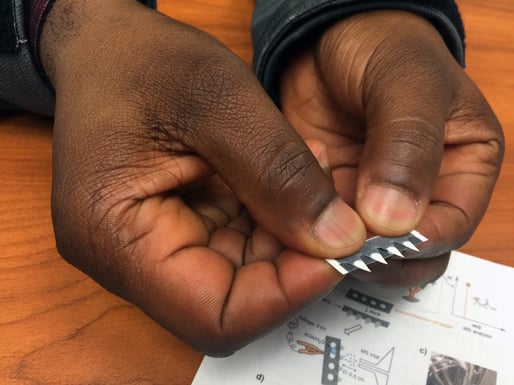
Dr. Abraham Badu-Tawiah, assistant professor at Ohio State University, is out to revolutionize the world of diagnostic testing. By making paper strips that can detect malaria and well as certain types of cancers, he hopes to make testing more practical and affordable. People would be able to simply apply a drop of blood to the paper test strip at home, much like diabetics do when testing their blood sugar, and then mail it to the laboratory. This new method would make medical diagnostics much more accessible for those who can’t easily get to a lab for testing.
According to the article on the University’s news site, this technology that is being developed by chemists at Ohio State University resembles current “lab on a chip” diagnostic; however, instead of plastic, these “chips” are made from sheets of plain white paper stuck together with two-sided adhesive tape. They are ran through a regular ink-jet printer that uses wax ink to create channels and reservoirs. The wax penetrates the paper and forms a barrier that captures the blood sample and keeps it between the layers.
These paper strips contain small synthetic chemical probes that carry a positive charge. The ionic probes are designed to tag specific antibodies that extract the biomarker of a disease from the blood and transfer it to the paper chip. Once there, the chemicals stay unchanged until the paper is dipped in an ammonia solution at the lab. The paper layers are pulled apart and the chemical probes allow for detection of biomarkers by a handheld mass spectrometer.
This technology is different than other paper-based medical diagnostics, such as home pregnancy tests, because it does not rely on enzymes to change the paper’s color. This technique is important for home tests that will have to be mailed to a lab. Dr. Badu Tawiah explains, “Enzymes are picky. They have to be kept at just the right temperature and they can’t be stored dry or exposed to light…But the ionic probes are hardy. They are not affected by light, temperature, humidity—even the heat in Africa can’t do anything to them. So you can mail one of these strips to a hospital and know that it will be readable when it gets there.”
